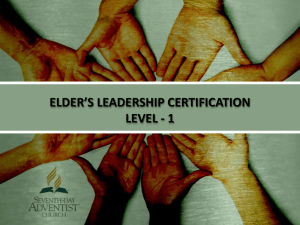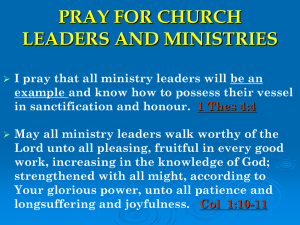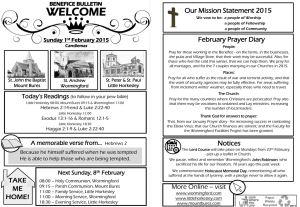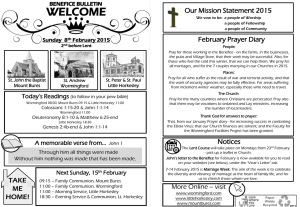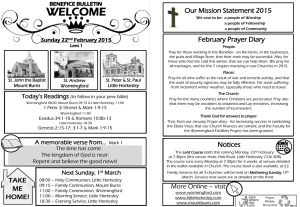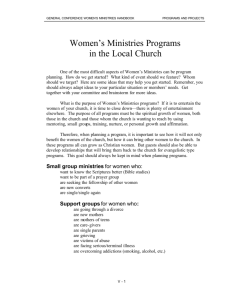Small Group Ministries and Support Groups
advertisement
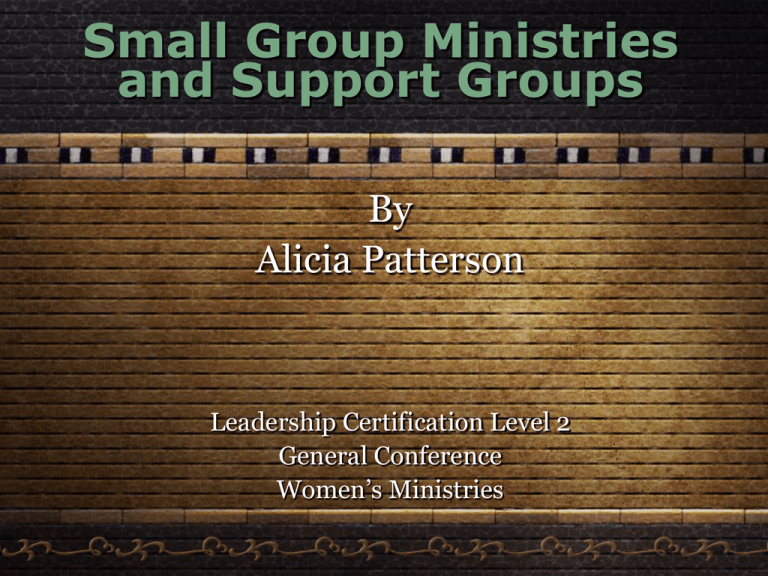
Small Group Ministries and Support Groups By Alicia Patterson Leadership Certification Level 2 General Conference Women’s Ministries Small Group Ministries and Support Groups Small groups are an effective tool for healthy spiritual and community relationships. Biblical Bases for Small Groups • The New Testament Model of Group-Based Discipleship—Discipleship is often thought to take place primarily in one-on-one Bible studies. But in the New Testament, making disciples was a group event. • The Example of the Early Christians—Acts 2:4247 1. “They devoted themselves to the apostles’ teaching” Element: Bible study Purpose: continual spiritual growth 2. “and to the fellowship” Element: sharing each other’s lives Purpose: community 3. “to the breaking of bread” Element: eating together Purpose: community 4. “and to prayer.” Element: prayer Purpose: continual spiritual growth 5. “Everyone was filled with awe,” Element: God shows up! Purpose: worship, outreach 6. “. . . and many wonders and miraculous signs were done by the apostles.” Element: miracles Purpose: outreach, service 7. “All the believers were together and had everything in common. Selling their possessions and goods, they gave to anyone as he had need.” Element: in-reach ministry Purpose: service, community, outreach 8. “Every day they continued to meet together in the temple courts.” Element: meeting together Purpose: worship, community 9. “They broke bread in their homes and ate together with glad and sincere hearts, praising God” Element: small home groups Purpose: community, worship, continual spiritual growth 10. “and enjoying the favor of all the people.” Element: Purposeful presence in the community. Purpose: outreach 11. “And the Lord added to their number daily those who were being saved.” Element: Life transformation Purpose: outreach The Essential Elements of a Successful Small Group 1. 2. 3. 4. 5. 6. People Food Bible study and life application Sharing each other’s lives Prayer Purposeful presence in the community What Makes Small Groups so Effective for Life Transformation? A. The Small Group Compared to the Church Service B. Intrinsic Human Needs Small Group Ministry; How Do I Get Started? 1. Start with Prayer! 2. Model and Mentor How Do I Find Small Group Leaders? 1. Look for group members who take the group seriously. 2. Consider those people who challenge your leadership. These may be potential leaders who are frustrated. 3. Look for gifted people whom you can recognize and affirm. 4. Pray regularly for guidance. How Do I Find Small Group Leaders? 5. Look for people who embrace the small group vision. 6. Try to look for people who exhibit spiritual, emotional, and social qualifications. 7. At the end of the duration of your pilot group, talk with potential leaders and hostesses from your group to assess their interest in leading the discussion or hosting a group. How Do I Overcome the Objections of Potential Leaders? 1. “I just don’t have the time.” 2. “I don’t have the gift of leadership.” 3. “I’m not the leadership type.” Training Your Group Leaders A. What qualities should a small group leader have? 1. A growing relationship with Jesus 2. A sense that God is calling her to lead a small group 3. Character and skill Training Your Group Leaders B. What are the basic responsibilities of a small group leader? 1. Find a hostess 2. Conduct life-changing group meetings 3. Prepare for your small group 4. Find resources 5. Share the responsibilities 6. Choose a person to mentor 7.Shepherd the members of your group 8. Expand the ministry 9. Encourage each group member to maintain a healthy relationship with the church A Typical Small Group Meeting 1. Gather the Group 2. Study the Bible 3. Pray Together Small Groups that Address Specific Needs 1. How do you find out what types of small group and support ministries are needed in your church? – Pray that God will help you hear their hearts of the women in your congregation. – As you are in conversations listen, for recurring themes in the needs and concerns that are expressed. – Use a diagnostic tool such as a questionnaire. Small Groups that Address Specific Needs 2. How do you find out what types of small group support ministries are needed in your community? – Listen, listen, listen: to your friends, to people you meet, to the conversations of people in the stores. – Note issues featured by the local media, in newspapers, and TV or radio news. – Ask. Survey people you know in the community or people on the street. What’s on your heart? What is occupying your mind? What do you find yourself thinking or worrying about? The Grief Recovery Group 1. Helping group members understand the stages and tasks of grief and its impact on every part of their life 2. Facilitating the sharing of stories of God’s healing presence throughout the process 3. Suggesting exercises to provide deeper understanding of what is being experienced 4. Providing strategies for coping with the symptoms of grief (such as bursting out in tears in public places) The Grief Recovery Group 5. 6. 7. 8. Suggesting resources for finding support systems for the holes that are left in one’s life by the death of a loved one Providing information on how to help family members deal with the impact of the death Helping members understand the impact of secondary losses (i.e. for a widow those losses might include: income, residence, change in lifestyle, social circle, loss of a role, friends, etc.) Giving practical examples of how to draw on a relationship with Jesus for strength, comfort, and guidance during this difficult time. The Divorce Recovery Group 1. Express their grief and hurt 2. Identify the reasons the marriage fell apart and determine which they were responsible for and which their partner was responsible for 3. Work through their feelings of hurt and anger towards their ex-spouse and come to a place of forgiveness 4. Apply biblical truths to the separation/divorce circumstances The Divorce Recovery Group 5. Admit and confess the things they should have done differently 6. Learn how to help stabilize their children and help them in their healing process 7. Determine how they can strengthen their character and walk with God, and heal from wounds of the past so that if God calls them into marriage again they are coming from a position of strength. The Small Group for Women Whose Husbands are Unchurched 1. Find true value and worth in Jesus 2. Recognize Jesus as their true husband 3. Express emotions and discuss crucial issues 4. Rest in God’s peace whatever the outcome 5. Ask for forgiveness (if needed), and relinquish the guilt of getting into the relationship because that will only keep the relationship from moving forward. The Small Group for Women Whose Husbands are Unchurched 6. Recognize that their husband is the father of their children and respect his role as the father. 7. Find joy even when their husbands continually reject invitations to come to church. 8. Decide to love their husbands through everything 9. Be an encourager rather than a discourager Mothers’ Small Groups 1. 2. 3. 4. A presentation or group discussion on some aspect of mothering (spiritual guidance, discipline, caring for physical needs, teaching, etc. The women might also be reading the same book on mothering together and come together to discuss it.) A time for moms to ask questions and share personal experiences. A time to pray for their children by name. Possibly some quiet time for mothers to write private prayers in a journal. A time to make a craft together or have a light refreshment. Singles’ Small Groups 1. 2. 3. Share an understanding of the experience of being single. Not just the difficulties, but also the benefits, such as time, flexibility, love not concentrated on one person but spread throughout many relationships with different people and generations. Study what God expects from them and that He can be counted on. Exploration of the topic of having a life partner in marriage: Do I want to? Should I? What is God’s will for me? To help people clarify their goals and then provide support for living a productive life as a single, or moving toward finding a partner. Singles’ Small Groups 4 Find and provide help with practical life skills such as what to do when your car breaks down. 5. Build up their understanding of their identity in Christ – that they have value and can have a productive and fulfilled life without a mate. 6. Help hold each other accountable to stay celibate -- maybe have an accountability partner. 7. Pray for each other. 8. Take part in activities with other women as well as in mixed-gender activities. Small Groups for Mothers Whose Children are Not Currently in the Church 1. Share stories, sorrow, and answers to prayer concerning children not in the church. 2. Brainstorm together. Think of ways to reach out. 3. Pray for children by name. Keep a prayer journal. 4. If the children have left the church, try to understand what it was about their church experience that they are reacting negatively against. Small Groups for Mothers Whose Children are Not Currently in the Church 5. Look for ways that God is moving in their children’s lives so they can thank and partner with God to minister to their children. 6. Concentrate on thanking God for making that child and remembering what a blessing they are and release them back to God.
